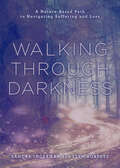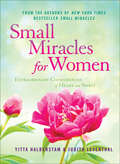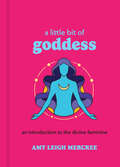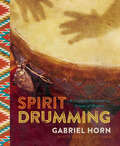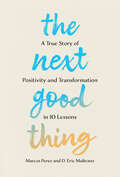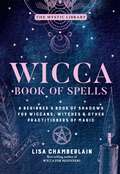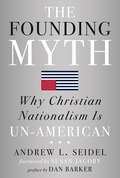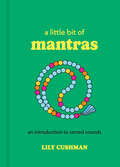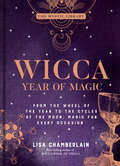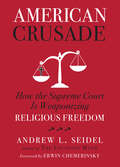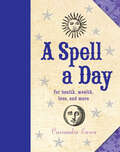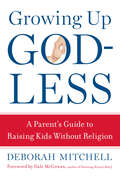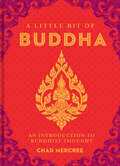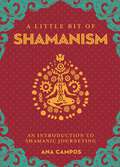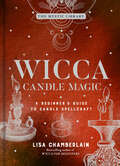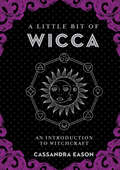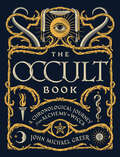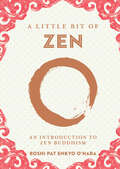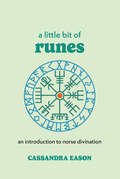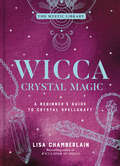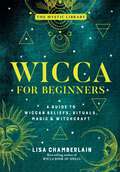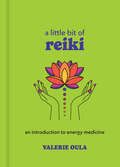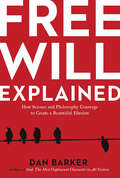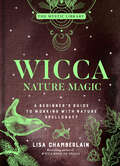- Table View
- List View
Walking through Darkness: A Nature-Based Path to Navigating Suffering and Loss
by Sandra Ingerman Llyn RobertsMay the teachings in this book help you walk wakefully as you find your way back home. Every one of us experiences periods of pain and loss in our life—dark nights of the soul. This is a groundless territory where one feels directionless and devoid of tools, with no sense of how to take the next step. In ancient times, elders guided their communities through life&’s initiations and challenges, paths we must all take to transform and grow. In Walking through Darkness, legendary shamanic experts Sandra Ingerman and Llyn Roberts help us forge a pathway through the dark—as we embrace nature as our guide and healer. Sandra and Llyn share metaphorical stories that engage animals, plants, trees, and other aspects of nature. Through the feminine process of circular joint storytelling, they weave the rich tales of their own experiences alongside wisdom that they have gathered for years from their own studies, as well as from healers around the globe. Through teachings from the land, the sky, the sea, and the spiritual world, this sensitive and empowering guide opens us to our spiritual light so that we can face our greatest challenges with courage and love—no matter what they are.
Small Miracles for Women: Extraordinary Coincidences of Heart and Spirit
by Yitta Halberstam Judith LeventhalEach and every woman is special and unique, yet as women we all share a common bond through our collective experiences of loving and learning. And sometimes fate steps in to miraculously change the lives of women in unforgettable ways, affecting them as wives, mothers, daughters, sisters, aunts, lovers, and friends. Could they be messages from a higher power? Whether these miracles come during times of difficulty or celebration, they represent extraordinary opportunities to explore the wonders life has to offer. One of the most popular books in the Small Miracles series, this beautifully repackaged and expanded volume collects more than 50 inspirational, unforgettable, and even divine stories of coincidence experienced by women from all walks of life.
A Little Bit of Goddess: An Introduction to the Divine Feminine (Little Bit Series #20)
by Amy Leigh MercreeDiscover the divine feminine with this introduction to the world of the goddess. From seasonal celebrations to miracles and rebirth, this entry in the popular Little Bit of series explores the power, magic, and rituals of the goddess. Learn all about the Maiden, Mother, and Wise Woman archetypes, the SHE of clay and stars, and meditations connected with her—including ones for love and passion, success and wealth, protection and intuition, and health and creativity. Enter the inner temple, pore through a Goddess Directory, and see how to become part of the Goddess Community.
Spirit Drumming: A Guide to the Healing Power of Rhythm
by Gabriel HornA heartfelt examination of the spiritual power of Native American drumming, including authentic stories, chants, and rituals.Perhaps the first conscious beating of the drum sound occurred as we gestated in the wombs of our mothers. Beat after beat, we grew within the sea of our births, and then we were born into the air of the world—when did we begin to separate from that beat? How long will it be before we hear the beating again? Gabriel Horn, White Deer of Autumn, is an award-winning writer who has provided a nuanced look at Native American culture and spirituality for decades. Now, he shows how drumming can take us back to our true selves and connect us to each other and the earth. Spirit Drumming follows his journey to the drums, including a history of drumming in Native American communities, an investigation of drums as living beings, and an authoritative reckoning on vibration as a conduit for healing. In addition to sharing stories of people he has known who have been affected by the drums, he also provides information on how to integrate other sacred elements in your drumming (such as feathers, cedar, sweetgrass, and tobacco), transcripts of chants you can use in your own practice, and ceremonies for thanksgiving, birth, the harvest, children, and more.
The Next Good Thing: A True Story of Positivity and Transformation in 10 Lessons
by D. Eric Maikranz Marcos PerezThe true story of a man whose life is transformed when he takes an unlikely caretaking job for a disabled 87-year-old who is more than he seems. Marcos&’s friends used to describe him as a happy family man, a successful graphic artist, and a joyous ukulele player. But then, he lost his marriage and his job, and nearly lost his newly outed transgender son to a suicide attempt after a violent attack by classmates. Marcos receded into a darkening depression as job applications went unanswered and bills piled up. An inability to afford his son&’s medication raised Marcos&’s anxiety to a breaking point. Desperate, he silently opened himself up to whomever or whatever might be listening and asked for help. The answer he got back from the universe was clear: &“Just do the next good thing.&” The next morning, he received the email that would change his life. The subject line read simply, &“Help our friend Joe.&” When Marcos clicked on it, he was surprised to find it was a job offer as a home caregiver to a remarkable 87-year-old named Joe Sabah.This book chronicles the inspirational true story of an old man near the end of his life who found a new friend and offered a lasting gift of 10 life-changing lessons for Marcos to share with others who still need to find their &“next good thing.&”
Wicca Book of Spells: A Beginner's Book of Shadows for Wiccans, Witches & Other Practitioners of Magic (The Mystic Library #1)
by Lisa ChamberlainBestselling Wiccan author Lisa Chamberlain has created the perfect, concise guide for the novice witch who wants to learn how to cast key Wiccan spells. With the help of this accessible guide by one of the most popular Wicca authors today, even beginners can successfully perform Wiccan spells to bring positive experiences into their life—and the lives of those they love. From thousands of potential spells, Lisa has chosen 50 of the most important, distilling them into three key categories of magical aims: love and relationships, including friends and family (such as &“Relationship Potential Divine Forecast&” and &“Spare Key Spell for Spiritual Connection&”); wealth and prosperity (&“Honey Abundance Jar" and &“Job Interview Success Spell&”); and health and well-being (&“Anxiety Calming Spell&” and &“Protection Spell for Pets&”). Plus, there&’s a section on divination and spellwork involving essential oils, moon phases, and homemade ingredients—from an avocado beauty spell to a chicory root victory charm.
The Founding Myth: Why Christian Nationalism Is Un-American
by Andrew L SeidelDo &“In God We Trust,&” the Declaration of Independence, and other historical &“evidence&” prove that America was founded on Judeo-Christian principles? Are the Ten Commandments the basis for American law? A constitutional attorney dives into the debate about religion&’s role in America&’s founding. In today&’s contentious political climate, understanding religion&’s role in American government is more important than ever. Christian nationalists assert that our nation was founded on Judeo-Christian principles, and advocate an agenda based on this popular historical claim. But is this belief true? The Founding Myth answers the question once and for all. Andrew L. Seidel, a constitutional attorney at the Freedom from Religion Foundation, builds his case point by point, comparing the Ten Commandments to the Constitution and contrasting biblical doctrine with America&’s founding philosophy, showing that the Bible contradicts the Declaration of Independence&’s central tenets. Thoroughly researched, this persuasively argued and fascinating book proves that America was not built on the Bible and that Christian nationalism is, in fact, un-American.
A Little Bit of Mantras: An Introduction to Sacred Sounds (Little Bit Series #14)
by Lily CushmanIn the popular &“Little Bit of&” series: a fresh, accessible introduction to the practice of chanting mantras. Chanting a mantra repeatedly can actually affect your state of mind, elevating your consciousness, altering your emotions, and bringing you peace. A Little Bit of Mantras presents an introduction to these sacred, spiritually empowering words, phrases, and sounds. It explores the history of mantras and how they work, and gives you chants that you can use with your yoga, meditation, or other daily practice.
Ignorance and Bliss: On Wanting Not to Know
by Mark LillWe want to know, we want not to know. We accept truth, we resist truth. Back and forth the mind shuttles, playing badminton with itself. But it doesn't feel like a game. It feels as if our lives are at stake. And they are. Aristotle claimed that "all human beings want to know." Our own experience proves that all human beings also want not to know. Today, centuries after the Enlightenment, mesmerized crowds still follow preposterous prophets, irrational rumors trigger fanatical acts, and magical thinking crowds out common sense and expertise. Why is this? Where does this will to ignorance come from, and how does it continue to shape our lives? In Ignorance and Bliss, the acclaimed essayist and historian of ideas Mark Lilla offers an absorbing psychological diagnosis of the human will not to know. With erudition and brio, Lilia ranges from the Book of Genesis and Plato's dialogues to Sufi parables and Sigmund Freud, revealing the paradoxes of hiding truth from ourselves. He also exposes the fantasies this impulse leads us to entertain--the illusion that the ecstasies of prophets, mystics, and holy fools offer access to esoteric truths; the illusion of children's lamblike innocence; and the nostalgic illusion of recapturing the glories of vanished and allegedly purer civilizations. The result is a highly original meditation that invites readers to consider their own deep-seated impulses and taboos.
Wicca Year of Magic: From the Wheel of the Year to the Cycles of the Moon, Magic for Every Occasion (The Mystic Library #8)
by Lisa ChamberlainMake your year a magical one with this beginner&’s guide to the eight Wiccan Sabbats held throughout the year, along with an exploration of lunar magic. Many Wiccans follow the Wheel of the Year, honoring eight Sabbats, or days of power, and Esbats, ritual occasions usually held at each Full Moon. In this handy guide, bestselling Wiccan author Lisa Chamberlain helps practitioners experience the magic of the turning seasons and the lunar cycle. She explores the spiritual themes of each Sabbat and shares spells aligned with the seasonal and divine energies of each holiday. You&’ll find fun ideas for celebrating these magical occasions, whether you&’re a solitary practitioner or a coven member. The book also takes an in-depth look at magical timing and the lunar cycle alongside spells you can incorporate into Esbat celebrations.
American Crusade: How the Supreme Court Is Weaponizing Religious Freedom
by Andrew L SeidelIs a fight against equality and for privilege a fight for religious supremacy? Andrew L. Seidel, a constitutional attorney and author of the critically acclaimed book The Founding Myth: Why Christian Nationalism Is Un-American, dives into the debate on religious liberty, the modern attempt to weaponize religious freedom, and the Supreme Court's role in that &“crusade.&” Seidel examines some of the key Supreme Court cases of the last thirty years—including Masterpiece Cakeshop v. Colorado Civil Rights Commission (a bakery that refused to make a wedding cake for a gay couple), Trump v. Hawaii (the anti-Muslim travel ban case), American Legion v. American Humanist Association (related to a group maintaining a 40-foot Christian cross on government-owned land), and Tandon v. Newsom (a Santa Clara Bible group exempted from Covid health restrictions), as well as the recent overturning of Roe v. Wade—and how a hallowed legal protection, freedom of religion, has been turned into a tool to advance privilege and impose religion on others. This is a meticulously researched and deeply insightful account of our political landscape with a foreword provided by noted constitutional scholar Erwin Chemerinsky, author of The Case Against the Supreme Court.The issue of church versus state is more relevant than ever in today&’s political climate and with the conservative majority status of the current Supreme Court. This book is a standout on the shelf for fans of Michelle Alexander, Bob Woodward, and Christopher Hitchens. Readers looking for critiques of the rise of Christian nationalism, like Jesus and John Wayne, and examinations like How Democracies Die will devour Seidel's analysis.Hardcover with dust jacket; 320 pages; 9 in H by 6 in W.
A Spell a Day: For Health, Wealth, Love, and More
by Cassandra EasonNeed money? Want more amour? Whatever your hearts desire, Cassandra Eason has a spell for it. Her fun, comprehensive compendium takes you through the year, with just the right magic to help make you prosperous, lucky, loved, and full of life. With its easy-to-use instructions and engaging, accessible design, its a must for anyone hoping to make dreams come true.
Growing Up Godless: A Parent's Guide to Raising Kids Without Religion
by Deborah MitchellIn a nation where religion plays such a big role, how can you raise a child without God? How do you instill morality, answer questions about mortality, and handle believers who expect to get a one-way ticket to heaven by converting you? Deborah Ann Mitchell, who has blogged and written columns on the subject, provides guidance to agnostics and atheists struggling with how to assert their beliefs in a reasoned, nonconfrontational, and honest manner.
A Little Bit of Buddha: An Introduction to Buddhist Thought (Little Bit Series #2)
by Chad MercreeAt its heart, Buddhism blossoms from one source: the words and life of Siddhartha Gautama, the Buddha. Chad Mercree, a lifetime student of Buddhist philosophy and meditation, reveals in simple language how Buddhism can yield personal growth in the modern world. Because every journey is unique, Mercree relates his own story, as well as the experiences of famous Buddhists throughout history, to help you apply Buddhas principles to your personal path.
A Little Bit of Shamanism: An Introduction to Shamanic Journeying (Little Bit Series #16)
by Ana CamposIn the popular &“Little Bit of&” series: a fresh, accessible introduction to shamanism—with a global view. Drawing from decades of training in Brazil and the United States, Ana Campos has written a history of shamanism that&’s both personal and global. She creates a methodology for bringing shamanic wisdom into our daily practices, and explains why it&’s important to establish a relationship with our helping spirits to heal ourselves and our communities. Through this incisive discussion of shamanism, we can become the vehicle for change our world so desperately needs right now.
Wicca Candle Magic: A Beginner's Guide to Candle Spellcraft (The Mystic Library #3)
by Lisa ChamberlainLearn to harness the power of candle magic and fire to enhance your spellwork. Many practitioners of Wicca and paganism use candles to work with fire, a powerful element that plays an important role in many rituals. Bestselling Wiccan author Lisa Chamberlain teaches contemporary witches how to use candles in their everyday magical practice. Readers will find trusted advice on selecting the best candle for their needs, the importance of candle colors, and ways to clear and charge their candles. This approachable guide also includes instructions for exciting spells and magical crafts—dabble with shadow work to repair a strained relationship, cultivate good luck with a weekly spell, and create a collection of magical oils for candle anointing.
A Little Bit of Wicca: An Introduction to Witchcraft (Little Bit Series #8)
by Cassandra EasonFrom an acclaimed author on witchcraft, an easy-to-use, informative introduction to Wicca. Wicca is growing in popularity, and Cassandra Eason—much admired for her writing on spiritual subjects—takes a look at its origins, its uses in everyday life, and its gods and goddesses. She explains how magick functions; how to create an altar and what tools you&’ll need; how to make your own spells, rituals, and chants; how to find a coven, and so much more!A contemporary guide to practicing Wicca Written by an acclaimed author on spiritual subjects, this book is an easy-to-understand introduction to Wicca and its origins, as well as an overview of how magick functions and how to use it in everyday life. You&’ll learn how to set up a Wiccan altar, collect and dedicate magickal tools, create and cast spells, and more.
The Occult Book: A Chronological Journey from Alchemy to Wicca (Union Square & Co. Chronologies)
by John Michael GreerExplore the occult from ancient times to the modern day with one of its most respected scholars and practitioners. Take an enlightening journey through occult history, exploring 100 dramatic incidents, arcane knowledge, and key historical figures from around the world. John Michael Greer delves into two millennia of tradition, from the earliest alchemists to pagan rituals; from the Philosopher&’s Stone to Cabala, the first tarot, and the Knights Templar; and from the first horoscopes to fortune-telling trials and the birth of modern witchcraft, or Wicca. Each entry features a stunning image or intriguing item of ephemera.
A Little Bit of Zen: An Introduction to Zen Buddhism (Little Bit Series)
by Roshi Pat O’HaraThis entry in the popular Little Bit of series introduces the ancient practice of Zen Buddhism. What is Zen? It&’s an ancient spiritual system rooted in Buddhism that began in China and spread throughout Asia, finally reaching the West. It encompasses meditation, mindfulness, and calming the mind—exactly what so many of us need and crave in this busy, stressful world. A Little Bit of Zen is the perfect, accessible introduction for newcomers, providing a history, overview, and exercises to use in their own daily practice, and covering everything from Zen literature to the ritual chants and bows.
A Little Bit of Runes: An Introduction to Norse Divination (Little Bit Series #10)
by Cassandra EasonFrom one of the world&’s most renowned authors on spirituality comes an accessible introduction to runes. Nordic runes are the most popular and easiest symbols to work with, and can effectively release energy for a positive purpose in one&’s life. Cassandra Eason, a well-known writer on crystals, Wicca, spells, and magic, explains to spiritual seekers exactly what runes are, how to make their own, which ones are right for them, and much more.
Wicca Crystal Magic: A Beginner's Guide to Crystal Spellcraft (The Mystic Library #4)
by Lisa ChamberlainExplore the magical powers of crystal and stone with bestselling Wiccan author Lisa Chamberlain. This entry in the Mystic Library series is perfect for anyone who wants to learn how to use these gifts of the earth for spells, elixirs, and charms. How do you begin collecting crystals—even on a budget? How do you clean, clear, and charge them? And which crystals are the best and most versatile?Wicca Crystal Magic explores these gifts of the earth, providing an overview of 13 popular crystals and stones in contemporary witchcraft, along with a comprehensive look at their practical applications in everyday spellwork. Since the spells themselves use only the stones featured in the guide—amethyst, bloodstone, carnelian, citrine, hematite, jet, moonstone, jade, lapis lazuli, malachite, quartz, rose quartz, and tiger&’s eye—this is perfect for beginners. The wide variety of elixirs, candle spells, and charms includes a Citrine Empowerment Elixir, Blessing for a New Home, Crystal Money Spell, Bad Habit Banishing Spell, Quartz Crystal Clarity Bath, and Spiritual Energy Amethyst Elixir.
Wicca for Beginners: A Guide to Wiccan Beliefs, Rituals, Magic & Witchcraft (The Mystic Library #2)
by Lisa ChamberlainFor anyone seeking to learn more about Wicca and begin practicing it, this introductory guide by bestselling author Lisa Chamberlain is the perfect entry point. As Wicca grows ever more popular, interested novices wonder: How can I get started? Popular Wiccan author Lisa Chamberlain answers their questions in this concise, yet comprehensive guide that covers all the basics: the history of Wicca, its deities, the core elements of its rituals and holidays, setting up an altar, choosing the right tools, the principles of magic and spellwork, how to begin practicing, and much more. She&’s also included a master spell suitable for beginners.
A Little Bit of Reiki: An Introduction to Energy Medicine (Little Bit Series #15)
by Valerie OulaIn the popular &“Little Bit of&” series: a fresh, accessible introduction to the practice of Reiki. The Japanese art of Reiki can reduce stress, aid relaxation, enhance energy, and promote healing. Expert teacher Valerie Oula introduces you to this profoundly beneficial hands-on practice, providing a history of Reiki and an overview of how it works. She includes exercises and meditations to help you tune into reiki energy and shows you where to go to experience a session and what to do to become a Reiki practitioner.
Free Will Explained: How Science and Philosophy Converge to Create a Beautiful Illusion
by Dan BarkerA compelling essay on free will from an internationally recognized authority on atheism, and author of God: The Most Unpleasant Character in All Fiction. Do we have free will? And if we don&’t, why do we feel as if we do? In a godless universe governed by impersonal laws of cause and effect, are you responsible for your actions? Former evangelical minister Dan Barker (God: The Most Unpleasant Character in All Fiction) unveils a novel solution to the question that has baffled scientists and philosophers for millennia. He outlines the concept of what he calls &“harmonic free will,&” a two-dimensional perspective that pivots the paradox on its axis to show that there is no single answer—both sides are right. Free will is a useful illusion: not a scientific, but a social truth.
Wicca Nature Magic: A Beginner's Guide to Working with Nature Spellcraft (The Mystic Library #7)
by Lisa ChamberlainLisa Chamberlain shows you how to harness nature energies to enhance and improve your life—whether you&’re well versed in other forms of magic but are just discovering nature magic, or are new to magic altogether. For most Witches, nature is the most sacred earthly manifestation—the practice of nature magic has endless potential. Bestselling author Lisa Chamberlain covers how nature was harnessed in ritual and magic by our pagan ancestors; the significance of trees and other plants to Wiccan cosmology and ritual practice; advice for forging (and deepening) personal magical connections with trees near you; profiles of 13 common magical trees and key flowers and plants—their lore, energetic properties, and magical uses; nature spirits; how to safely and respectfully harvest magical ingredients from nature; ideas for making your own wand; nature magic spells, meditations, rituals, and more.
